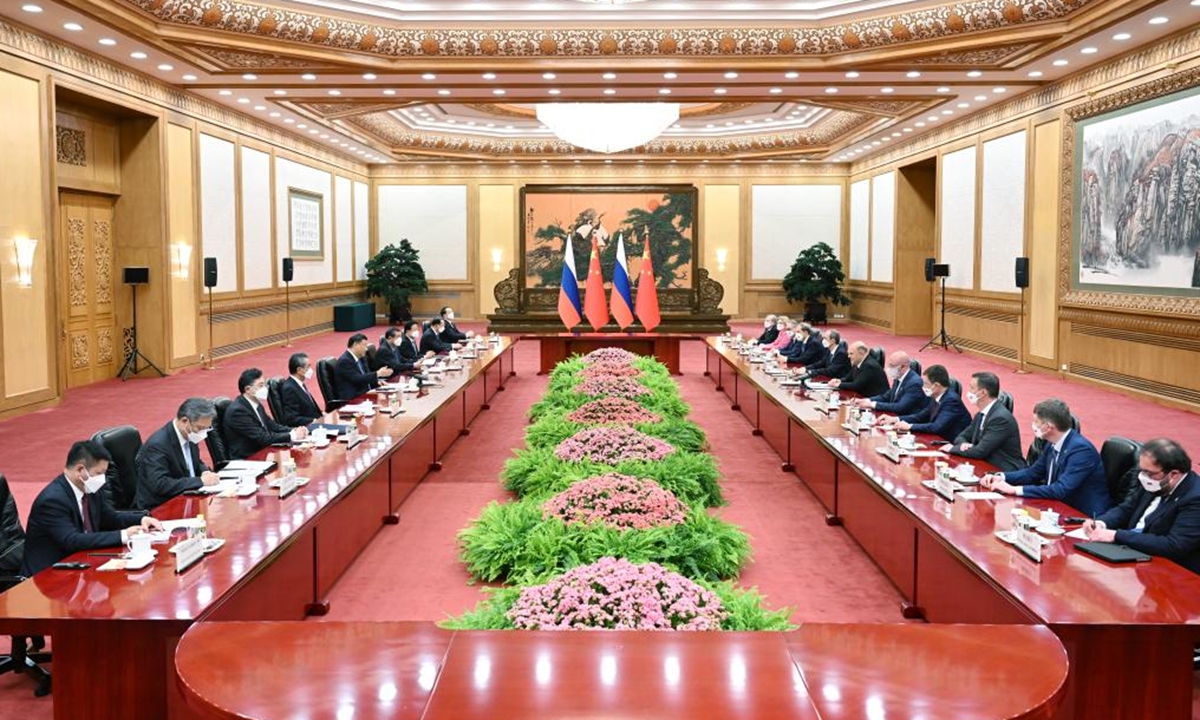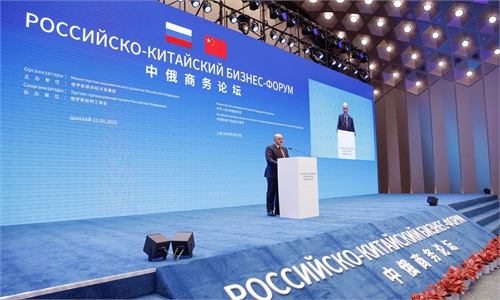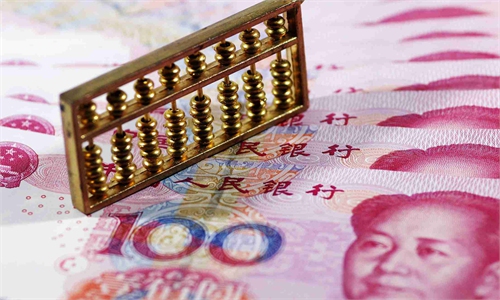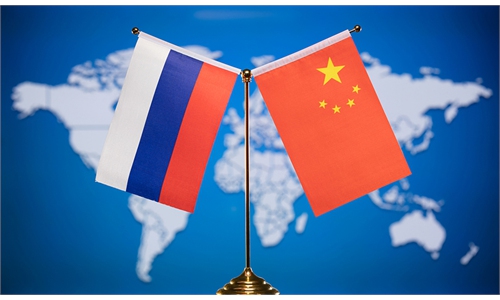China-Russia cooperation is broader than what US-led West can envision: Global Times editorial

Chinese President Xi Jinping meets with Prime Minister of the Russian Federation Mikhail Mishustin at the Great Hall of the People in Beijing, capital of China, May 24, 2023. (Xinhua/Zhang Ling)
On the afternoon of May 24, Chinese President Xi Jinping met with Prime Minister of the Russian Federation Mikhail Mishustin, who was on an official visit to China, at the Great Hall of the People in Beijing. Mishustin also held talks with Chinese Premier Li Qiang on the same day. China and Russia signed a series of bilateral agreements on service trade cooperation, sports, patents, and Russian millet exports to China, which shows significant results of Mishustin's first visit to China since taking office as Russian Prime Minister. The increase in quality of China-Russia economic and trade cooperation, coupled with a full tank of oil, will drive them toward a farther and broader future.
The size and level of the Russian team and the number of entrepreneurs accompanying Mishustin is rare in recent years. The visit mainly aimed at implementing cooperation projects and further expanding economic cooperation. In March this year, President Xi made a successful state visit to Russia and outlined the blueprint for the development of China-Russia relations and cooperation in various fields with President Vladimir Putin. This visit by Mishustin to China is promoting the implementation of the blueprint, and with the joint efforts of both China and Russia, it will become a roadmap and construction plan, and eventually be built into a beautiful reality. As a result, China-Russia economic revitalization will receive a continuous and strong impetus, and more people from both countries will feel and enjoy the tangible benefits brought by mutually beneficial cooperation.
The rich practice of the comprehensive strategic partnership of coordination between China and Russia in the new era tells us that when the political mutual trust between the two countries reaches a certain level, the world suddenly becomes more open, presenting opportunities and potential for mutually beneficial cooperation. In addition to the traditional energy trade, Russia is focusing on deepening the integration of the Advanced Special Economic Zones in Far East with the revitalization of Northeast China, promoting RMB settlement in finance, strengthening cooperation in infrastructure construction, and continuously improving the level of cross-border transportation connectivity, all of which provide great room for imagination. Some past problems have also been solved, and blockages and bottlenecks have been gradually cleared. Of course, the road must be taken step by step, and the all-round cooperation between China and Russia is steadily advancing.
This is the essence of the new type of major-country relationship, and we strongly suggest that Washington take it seriously. Because Washington's narrow-mindedness cannot accommodate China or Russia, making even the vast Pacific Ocean seem cramped. Western media, whose minds are filled with confrontation, become nervous at the sight of normal cooperation between China and Russia. They either advocate for China and Russia to "join forces to resist the West" or stir up the old tune of "Russia is dependent on China" to provoke China-Russia relations. Is it possible for the US to contain and suppress China, isolate Russia in all respects, and try to isolate China and Russia from each other as well?
The root of this divided attitude in the US lies in its uncontrollable hegemonic impulses and the fear of the so-called "China-Russia alliance," which is considered the US' greatest geopolitical nightmare. These two factors create an internal conflict and psychological strain that the US cannot resolve. The tense atmosphere over the Asia-Pacific region is essentially an external manifestation of Washington's geopolitical anxieties. Discussing global affairs in front of the world map in their offices, armchair strategists in Washington can only perceive threats and adversaries. Through their meddling, they bring about a self-fulfilling prophecy, pushing countries that could have been potential partners to the opposite side of the US and creating the most severe strategic risks of the era.
We often emphasize that the cooperation between China and Russia is neither directed against third parties nor subject to third-party interference or coercion. This principle guides China's interactions not only with Russia but also with all countries, including those from Europe, the Middle East, and neighboring regions. It stands in stark contrast to the practices of hegemonism: one emphasizes "non-targeting" and "non-interference and non-coercion," while the other is precisely engaged in "targeting," "interference," and "coercion" worldwide. The former has created astonishing miracles of peace and development, while the latter has left countless scars and conflicts.
Through practical actions, China and Russia continue to enrich the content of their comprehensive strategic partnership of coordination in the new era, outlining a clearer profile of a new type of international relationship, which not only provides the world with more impetus for development but also serves as a valuable benchmark and model. The resilience of China-Russia cooperation against interference has significantly strengthened, and the noise generated by the US and Western countries serves as a reverse motivation for us to continue moving forward. Just as the famous Tang Dynasty poem quoted by Mishustin during his visit to China goes, "You will enjoy a grander sight, if you climb to a greater height."



